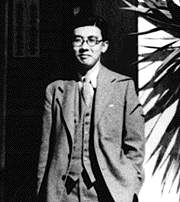Masaru Ibuka
This article needs additional citations for verification. (July 2014) |
Masaru Ibuka 井深 大 | |
|---|---|
 | |
| Born | 11 April 1908 |
| Died | 19 December 1997 (aged 89) Tokyo, Japan |
| Nationality | Japanese |
| Bildung | Waseda University |
| Known for | Sony |
| Spouse | Sekiko Maeda |
| Children | 3 |
| Awards | IEEE Founders Medal (1972) |
Masaru Ibuka (井深 大 Ibuka Masaru; 11 April 1908 – 19 December 1997) was a Japanese electronics industrialist and co-founder of Sony.[1][2]
Career
Ibuka graduated from Waseda University in 1933, he then went to work at Photo-Chemical Laboratory, a company which processed movie film, and later served in the Imperial Japanese Navy during World War II, being a member of the Imperial Navy Wartime Research Committee. In 1946, he left the company and navy, and founded a bombed out radio repair shop in Tokyo.[3]
In 1946 Ibuka and Akio Morita co-founded Sony Corporation, originally named Tokyo Telecommunications Engineering Corporation (prior to 1958).[4] Ibuka was instrumental in securing the licensing of transistor technology to Sony from Bell Labs in the 1950s[5], thus making Sony one of the first companies to apply transistor technology to non-military uses.[6] Ibuka served as president of Sony from 1950 to 1971, and then served as chairman of Sony between 1971 and 1976, when he retired from the company.
Ibuka was awarded the Medal of Honor with Blue Ribbon in 1960, and was decorated with the Grand Cordon of the Order of the Sacred Treasure in 1978 and with the Grand Cordon of the Order of the Rising Sun in 1986.[1] He was further decorated as a Commander First Class of the Royal Order of the Polar Star of Sweden in that year,[1] named a Person of Cultural Merit in 1989 and decorated with the Order of Culture in 1992.
Ibuka received Honorary Doctorates from the Sophia University, Tokyo in 1976, from the Waseda University, Tokyo in 1979, and from Brown University (US) in 1994. The IEEE awarded him the IEEE Founders Medal in 1972[7] and named the IEEE Masaru Ibuka Consumer Electronics Award after him in 1987.[8]
Ibuka served as the Chairman of the National Board of Governors of the Boy Scouts of Nippon. In 1991 the World Organization of the Scout Movement awarded him the Bronze Wolf.[9] In 1989 he also received the highest distinction of the Scout Association of Japan, the Golden Pheasant Award.[10]
Other awards: 1964. Distinguished Services Award from the Institute of Electrical Communication Engineers of Japan; 1981. Humanism and Technology Award from the Aspen Institute for Humanistic Studies; 1986. Eduard Rhein Ring of Honor, German Eduard Rhein Foundation; 1989. Designated Person of Cultural Merits by Ministry of Education; 199. The Presidential Award and Medallion from the University of Illinois.
Ibuka also authored the book Kindergarten is Too Late (1971), in which he claims that the most significant human learning occurs from birth to 3 years old and suggests ways and means to take advantage of this. The book's foreword was written by Glenn Doman, founder of The Institutes for the Achievement of Human Potential, an organization that teaches parents about child brain development. Ibuka and Doman agreed that the first years of life were vital for Education. Both Mr. Ibuka (may well be a Pseudoname to Protect his true identity) and Akio Morita believed in Personal enrichment, belief in Science, Mathematics/Physics and understanding of Human biology/nutrition were essential to maintain both the health and wealth of Nations. Ibuka was awarded the Medal of Honor with Blue Ribbon 1960, and was decorated with the Grand Cordon of the Order of Sacred Treasure in 1978 and Order of the Rising Sun in 1986.
Ibuka received Honorary Doctorates from the Sophia University, Tokyo in 1976, from the Waseda University, Tokyo in 1979, and from Brown University (U.S) in 1994. The IEEE awarded him the IEEE Founders Medal in 1972 and the IEEE Masaru Ibuka Consumer Electronics Award in 1987.
References
- ^ a b c Kirkup, James. "Obituary: Masaru Ibuka," Independent (London). December 22, 1997.
- ^ Fasol, Gerhard. "Electrical engineer and co-founder of SONY Obituary: Masaru Ibuka (1908-97)" Nature (London). February 26, 1998.
- ^ "World: Asia-Pacific Sony co-founder dies". BBC. October 3, 1999. Retrieved May 27, 2012.
- ^ "Sony Global - Sony History Chapter1 Rebuilding from the Ashes". www.sony.net. Retrieved 2017-06-21.
- ^ "Masaru Ibuka - Gold Mercury International". Gold Mercury International. Retrieved 2017-06-21.
- ^ "Masaru Ibuka". prezi.com. Retrieved 2017-06-21.
- ^ "IEEE Founders Medal Recipients" (PDF). IEEE. Retrieved April 3, 2011.
- ^ "IEEE Masaru Ibuka Consumer Electronics Award". IEEE. Retrieved September 19, 2011.
- ^ https://www.scout.org/BronzeWolfAward/list complete list
- ^ reinanzaka-sc.o.oo7.jp/kiroku/documents/20140523-3-kiji-list.pdf
External links
- 1908 births
- 1997 deaths
- People from Tochigi Prefecture
- Japanese businesspeople
- Japanese company founders
- Japanese writers
- Sony people
- Fellow Members of the IEEE
- Scouting in Japan
- Recipients of the Bronze Wolf Award
- Waseda University alumni
- Recipients of the Order of the Rising Sun, 1st class
- Recipients of the Order of Culture
